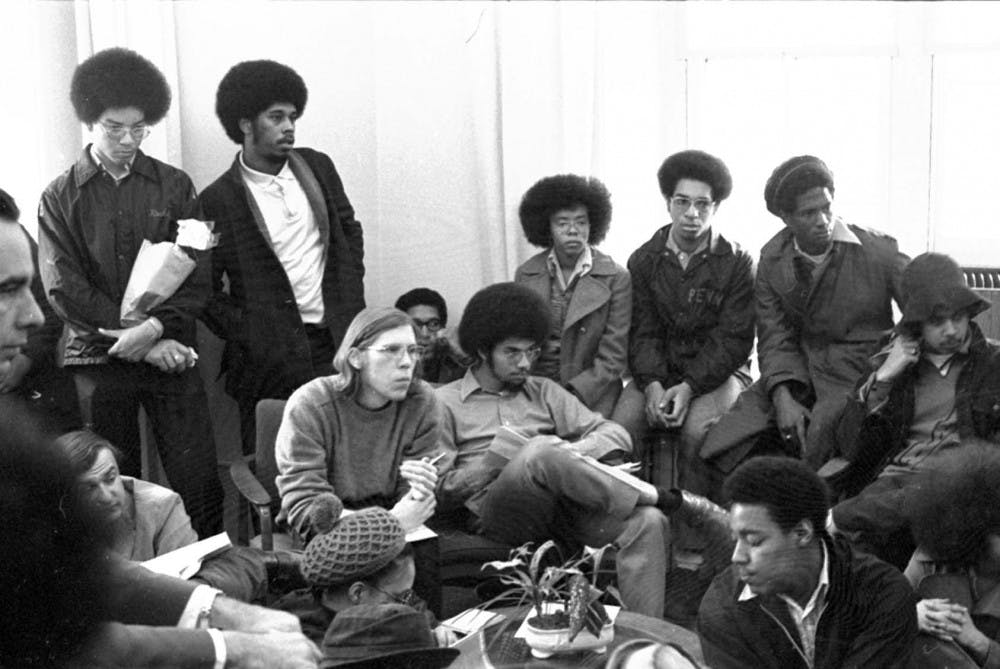Du Bois College House, a house rich with tradition, history and culture, celebrated its 40th anniversary this year.
The 1970s was a tumultuous time for the United States, as well as for Penn. Du Bois was created during this time in response to student protests during the civil rights movement, offering a haven and cultural center.
Four decades later, Du Bois still has the same focus on diversity and African American culture.
“The population of the house has changed significantly, and the physical environment has changed because we were renovated four years ago,” said Du Bois House Dean Patricia Williams. “What remains the same is that we’re still committed to being a theme-based house that focuses on the culture and history of African Americans.”
Du Bois was founded in 1972, after the increased enrollment of many new black students in response to the civil rights movement of the previous decade.
Black students, at the time, felt that they needed a place of their own on campus. After a series of protests in order to have a living space solely for those who were interested in black culture, the students met with the administration to find a solution.
There was much uproar over the black students’ request to have a common residence hall for themselves.
The Vice Provost for Undergraduate Education said to a news publication then that the proposed residence hall would give black students “a much fuller role than they now play in the general overall life at the University.”
Related
10/15/2012 Du Bois House Council | Appreciating Du Bois as a loving home
2/19/2012 W.E.B. Du Bois receives honorary emeritus professorship
However, many people disagreed with the creation of a primarily black residential hall, calling it “reverse discrimination” and “separatism” in articles published during this time by The Daily Pennsylvanian, The Pennsylvania Voice and even The New York Times.
Even the National Association for the Advancement of Colored People threatened to file lawsuits against the University, believing that the house was unconstitutional and violated the 14th Amendment.
Despite the disagreements, a solution was found in the dorm then known as Low Rise North, which was transformed into Du Bois.
According to Mark Lloyd, Director of the University Archives and Records Center, the building already existed prior to the creation of the superblock located between 38th and 40th and Walnut and Spruce streets.
The new college house was open to all members of the university, regardless of race.
In 1974, it was renamed the Du Bois College House, after W.E.B. Du Bois, who was appointed a post-doctoral fellow at Penn in 1896.
“I’m comfortable here,” Denise Heisser, a sophomore who lived in Du Bois in 1974, said in an old DP article. ”Living in the [college house] project doesn’t mean you can’t get along with whites, it just makes you feel more at ease.”
Back in the ’70s, Du Bois was dedicated to planning a wide variety of cultural events for its students. For example, the house brought in speakers from the Student Nonviolent Coordinating Committee to speak to residents about activism.
Today, Du Bois still focuses on implementing many programs, especially ones to educate its diverse student population.
“I’m a firm believer that all students can learn by being exposed to other cultures,” Williams said. “The exposure here gives everyone an opportunity to learn about our history and our culture.”
In addition, they hold fun events like Super Bowl parties, movie and theater outings, as well as events sponsored by student organizations.
Farrah Alkhaleel, a College junior and Du Bois House Council president said, “I’ve lived here since my freshman year and have enjoyed every part of it.” She and the other members of the House Council are responsible for coordinating many of the events that take place at Du Bois.
“We are really focused on bringing everyone together and not segregating each other,” Alkhaleel said.
Whereas Du Bois first started out as a center for black culture, it has since shifted its role. Back then, it served as an important resource for black students on campus, but with the creation of the Makuu Black Cultural Center and later, UMOJA, Du Bois has become a community for all.
“It’s a home away from home,” Williams said. “It’s a very tight knit community with an emphasis on community.”
Related
10/15/2012 Du Bois House Council | Appreciating Du Bois as a loving home
2/19/2012 W.E.B. Du Bois receives honorary emeritus professorship



